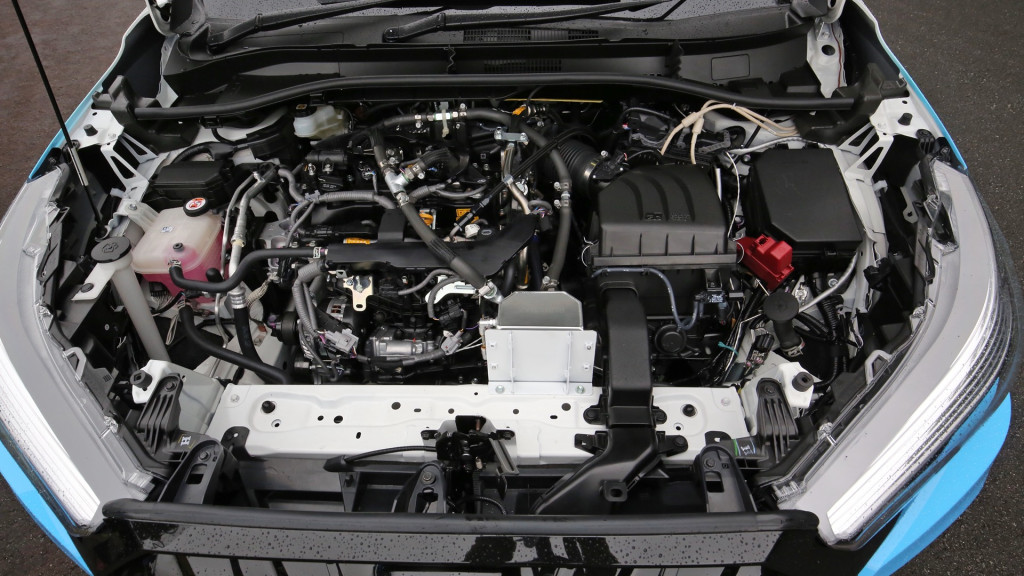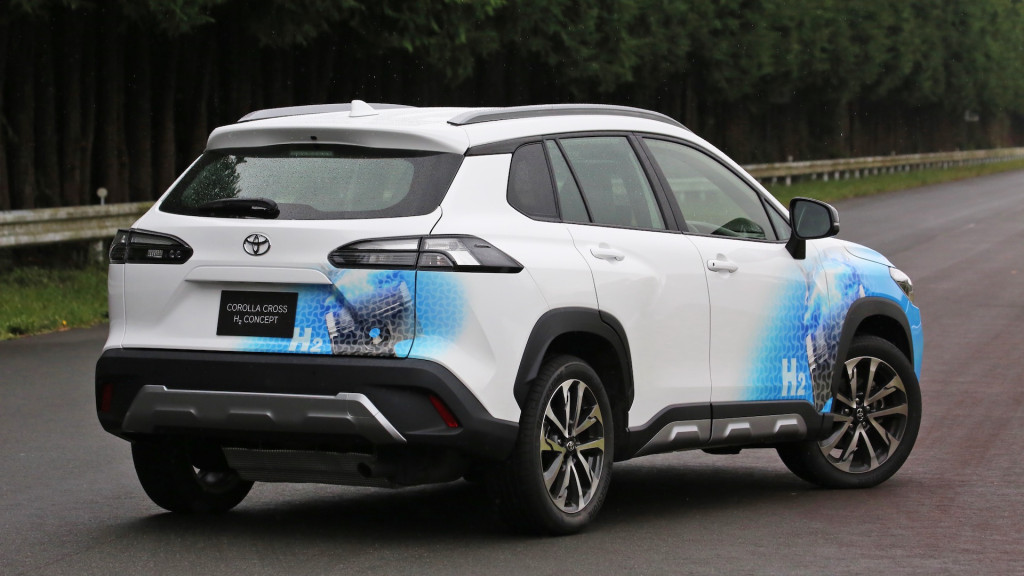
Toyota believes hydrogen combustion engines could be a viable alternative to EVs, and it’s demonstrating the concept with a prototype version of its Corolla Cross.
On Tuesday, the automaker unveiled the hydrogen-combustion Corolla Cross H2 Concept, saying in a press release that the vehicle would begin testing in northern Japan this winter. It didn’t discuss a production timeline, but said it’s “around 40% along the path to commercialization.”
Toyota is heavily involved in hydrogen fuel cells, but this Corolla Cross has an internal-combustion engine—a 1.6-liter turbo-3 taken from the GR Corolla hot hatchback—that burns gaseous hydrogen in its cylinders instead of gasoline. The engine got a hydrogen-specific direct injection system, and the car was fitted with hydrogen tanks based on know-how from the Toyota Mirai, but other than that it largely resembles a gasoline vehicle. It even has a manual transmission.

Toyota Corolla Cross H2 Concept
The Corolla Cross prototype incorporates lessons learned from motorsports. Toyota announced earlier last year that it was developing hydrogen-combustion engines for racing, and has since demonstrated them in the Japanese Super Taikyu endurance-racing series and in a non-competition run on a World Rally Championship (WRC) stage in Belgium.
Over the course of one Super Taikyu season, Toyota claims it increased horsepower by 24% and torque by 33%, achieving performance it claims is comparable to that of gasoline engines. Toyota said it also increased range by 30% and reduced refueling time from approximately five minutes to one and a half minutes.
Prior to Toyota, BMW was the most noteworthy example of demonstrating hydrogen combustion as an alternative to fuel cells; it made a hydrogen internal-combustion version of its 7-Series nearly 20 years ago. While some of the drivability (and range) issues of that model may be solved by now, one major issue remains.

Toyota Corolla Cross H2 Concept
Toyota believes hydrogen combustion “illustrates another possible alternative path to zero emissions.” It’s unclear what the automaker means by that, however, because hydrogen combustion does produce some tailpipe emissions, including nitrogen oxide (NOx)—the pollutant at the core of the Volkswagen diesel scandal.
Toyota argues that hydrogen combustion will achieve some level of emissions reduction while leveraging existing fossil fuel infrastructure and sidestepping environmental issues related to battery-mineral mining. Even if green hydrogen is ready to scale up this decade, as recent analysis predicts, it remains unknown how Toyota might handle tailpipe emissions in such a vehicle.
The experimental vehicle is more proof that Toyota doesn’t plan to put all of its eggs in the battery basket. This week it also showed a C-HR plug-in hybrid concept and confirmed those powertrains still have a future in its lineup. The automaker has reportedly paused EV development as it considers a deeper commitment to battery electric vehicles. But this week’s concepts don’t altogether suggest that an upped EV target might be the outcome.


 Exploring New Car Ratings: A Comprehensive Insight into Automotive Excellence
Exploring New Car Ratings: A Comprehensive Insight into Automotive Excellence  The Ram 1500 Rebel Havoc edition is a bit of deja vu
The Ram 1500 Rebel Havoc edition is a bit of deja vu  F1 Live Updates: Miami 2023
F1 Live Updates: Miami 2023  Electric Corvette sparked on 70th anniversary
Electric Corvette sparked on 70th anniversary  Understanding and Bringing Uber Claims: Insurance and Your Rights
Understanding and Bringing Uber Claims: Insurance and Your Rights  Free Car For Unemployed From The Government 2023
Free Car For Unemployed From The Government 2023  Smart budgeting strategies for tradespeople
Smart budgeting strategies for tradespeople  Vintage Ring Settings Loved by London Couples
Vintage Ring Settings Loved by London Couples